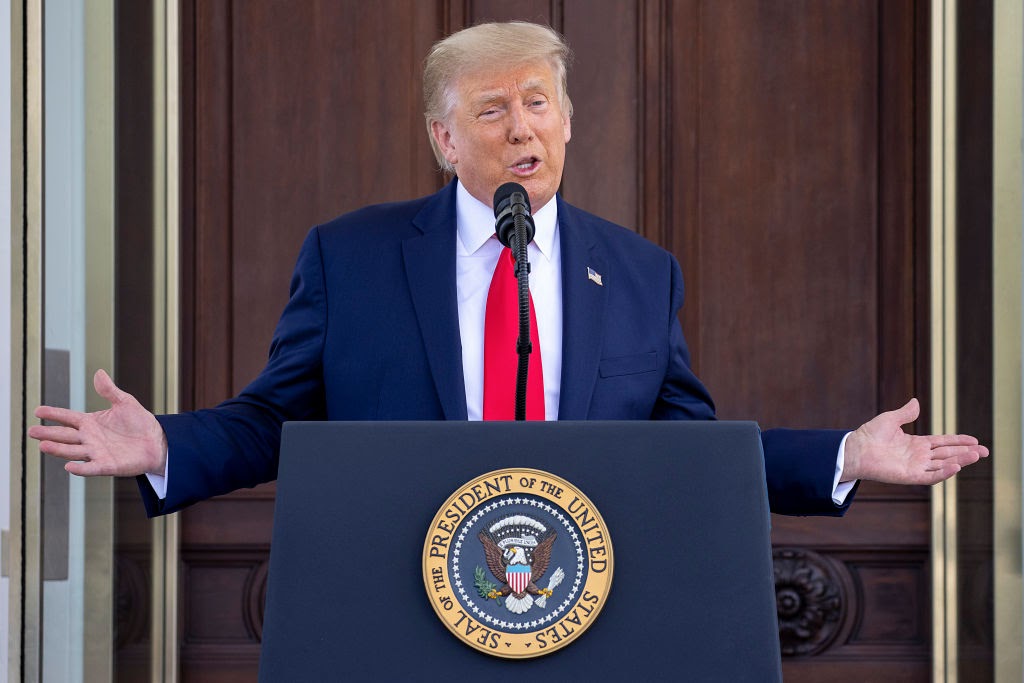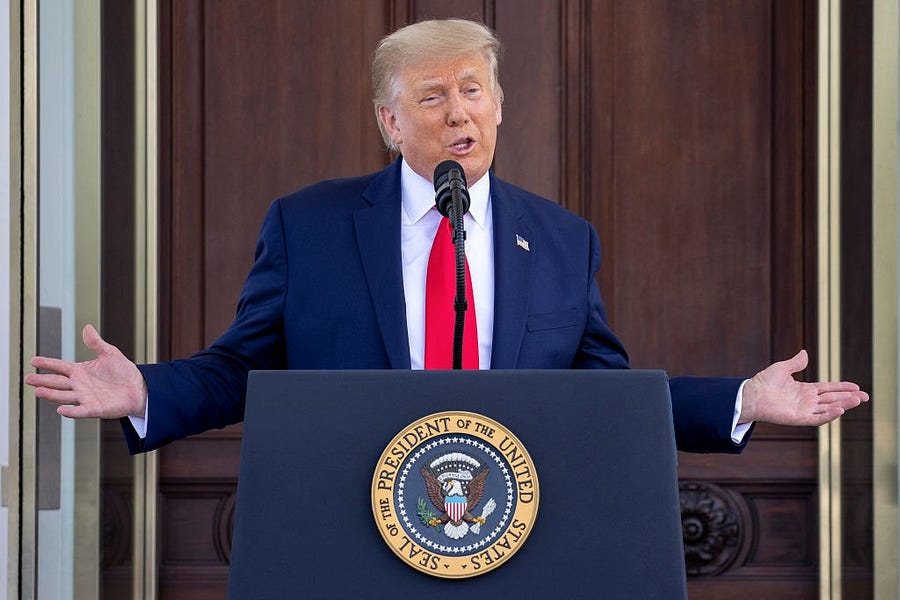Happy Friday! If we had known how short the vice presidential debate news cycle was going to be, maybe we wouldn’t have made Declan stay up until 3:00 a.m. finishing his recap of it last night after Dispatch Live.
Quick Hits: Today’s Top Stories
-
The United States confirmed 52,097 new cases of COVID-19 yesterday per the Johns Hopkins University COVID-19 Dashboard, with 5.0 percent of the 1,040,651 tests reported coming back positive. An additional 904 deaths were attributed to the virus on Thursday, bringing the pandemic’s American death toll to 212,657.


-
The Commission on Presidential Debates announced Thursday morning that the next presidential town hall debate scheduled for Oct. 15 will be held virtually to “protect the health and safety of all involved.” The Biden campaign accepted the new terms, but the Trump campaign did not, releasing an early morning statement saying Trump will hold a rally instead of debate remotely. The remaining two debates are in flux as the two campaigns haggle over the details, but the Trump campaign appeared to be considering reversing course late Thursday night.
-
The Justice Department charged six people for plotting to kidnap Democratic Michigan Governor Gretchen Whitmer and have her stand “trial” for treason prior to the November election, according to a criminal complaint unsealed on Thursday. The group began meeting in June, and its members were allegedly unhappy with Whitmer’s coronavirus restrictions.
-
President Trump said via Twitter on Wednesday that the U.S. military should have all its remaining troops in Afghanistan “home by Christmas,” contradicting national security advisor Robert O’Brien’s comments hours earlier that the U.S. would reduce its presence in Afghanistan to 2,500 troops by early next year.
-
House Speaker Nancy Pelosi and Treasury Secretary Steve Mnuchin spoke over the phone on Thursday about a coronavirus relief bill, resuming bipartisan negotiations just two days after the president put them to a halt. A deal is not imminent, or even likely, but negotiations are not as dead as they seemed earlier this week.
-
The Trump administration placed additional sanctions on Iranian banks on Thursday. Treasury Secretary Steve Mnuchin said the sanctions “will continue to allow for humanitarian transactions to support the Iranian people,” but the move sparked criticism from European allies who warn it will prevent the importation of medical supplies, food, and coronavirus relief packages into Iran.
-
Biotechnology company Moderna Inc. said Thursday it will not enforce patents on its experimental COVID-19 vaccine during the pandemic and may offer patent licenses to other drugmakers.
-
Facebook removed a network of accounts connected to pro-Trump youth group Turning Point USA and marketing firm Rally Forge for “coordinated inauthentic behavior,” using fake accounts to spread misinformation about presidential candidates Donald Trump and Joe Biden.
-
Initial jobless claims last week modestly exceeded expectations, with 840,000 Americans filing for unemployment insurance, a slight downtick from 849,000 the week prior.
-
More than 57 million people watched Wednesday’s debate between Vice President Mike Pence and Sen. Kamala Harris according to preliminary Nielsen ratings of the eight biggest channels, a measurable increase from the 37 million people who watched Pence and Sen. Tim Kaine face off in 2016. The total viewership was likely even higher due to internet streamers and radio listeners, who were not included in the Nielsen ratings.
Before we get started today, just a quick editorial note: We know we’ve been hitting the election and the horse race pretty hard in our TMD coverage lately. Our natural inclination is to diversify topic selection and steer clear of the pure politics of the daily news cycle, but nearly every subject we’ve written about over the past year (literally, today is TMD’s first birthday!) will be affected in some way by what happens on November 3. There are 25 days until then, and our plan is to lean pretty hard into covering developments in races up and down the ticket, all while continuing to bring you coverage of an array of other issues. Now, enough throat clearing.
If Donald Trump Was Trying to Lose the Election, What Would He Be Doing Differently?

Before we get started today, let’s make one thing clear: Donald Trump is losing the presidential race. Badly. Joe Biden’s average lead in national polls has crept up to 10 percentage points—the highest FiveThirtyEight has had it all cycle—and the former vice president’s numbers in battleground states are increasingly not far behind. He’s got a 9-point lead in Minnesota, an 8.3-point edge in Michigan, 7-point margins in both Wisconsin and Pennsylvania, and 4.2-point advantages in both Florida and Arizona. Even if the polls underestimate Trump’s support by as much as they did in 2016, Biden would still win the presidency with approximately 335 electoral votes.
Now for the caveats. Not everyone who responds to a poll ends up making it to the polls; Trump’s campaign, with its apparent ground-game advantage, might be better placed to juice turnout. Biden supporters are far more likely to vote by mail than Trump supporters and mail-in ballots are significantly more likely to be disqualified than in-person ones. Polls could theoretically be underestimating Trump’s support by even more than they did in 2016. Oh, and there are still 25 days left: plenty of time for the narrative to change and the race to tighten. Donald Trump still has a chance—FiveThirtyEight pegs it at 15 percent as of last night—to turn this thing around.
But if the president’s behavior this week is any indication, it’s almost as if he doesn’t want to. While Trump was at Walter Reed last weekend, we heard rumblings of an effort among the president’s advisers to use his COVID-19 affliction as an opportunity to reset the campaign. Conservative columnist Marc Thiessen made the case in a Washington Post op-ed. “The president should deliver an address to the nation on his recovery and the way forward in the battle against the virus,” Thiessen wrote. “He should begin by thanking Joe Biden for his graciousness during this difficult moment and talk about how moved he was by the prayers of millions of Americans—including many who do not support him—for his and the first lady’s recovery. He should discuss his experience fighting [COVID-19] in deeply personal terms and express his empathy and solidarity with the millions of Americans who have struggled with it.”
Suffice it to say, Trump has … not done that. Instead, he needlessly exposed Secret Service agents to infection by having them drive him around Walter Reed to wave at supporters. He made a dramatic return to the White House on Monday, performatively taking off his mask for the cameras before entering the residence. He’s revived his it’s-just-like-the-flu rhetoric, and told Americans to not let COVID “dominate” them. “Don’t be afraid of it,” he said.
Whether Trump is right on the science of these arguments (he’s not) is almost beside the point, at least politically. He is on the losing side of the coronavirus culture war, and he’s doubling down. About two-thirds of Americans report being very or somewhat concerned that they or a loved one will contract COVID-19. Seventy-four percent of respondents in a recent National Geographic poll report “always” wearing a face mask when leaving home; only eight percent say they “rarely or never” do. Just 27 percent of those surveyed a few weeks ago told Gallup they would return to their normal day-to-day activities right away if all government coronavirus restrictions were lifted, and only nine percent of voters last month listed economic issues as the “most important problem facing the country today” compared to 25 percent who said the coronavirus was.
So when Trump mocks Biden for wearing a mask too often, or tells Americans he “feel[s] better than [he] did 20 years ago” after contracting the virus, or hosts non-socially-distanced ceremonies at the White House that were likely superspreader events, he may be placating a subset of his base. But he’s alienating far more voters than he’s bringing in, especially, as Jonah recently noted, among the elderly.
Mitch McConnell has seen enough, and is making a last-ditch effort to salvage his senate majority. “I actually haven’t been to the White House since August the 6th because my impression was their approach to how to handle this was different than mine and what I insisted that we do in the Senate, which is to wear a mask and practice social distancing,” he told reporters in Kentucky. “If any of you have been around me since May the 1st, I’ve said, ‘Wear your mask. Practice social distancing. … It’s the only way that we know of to prevent the spread until we get a vaccine. And we practice that in the Senate. Now, you’ve heard of other places that have had a different view, and they are, you know, paying the price for it.”
We sent McConnell’s remarks to a GOP strategist working on a competitive senate race, asking if they were a signal to Republicans campaigning across the country. They were. “The message [from McConnell] to Republicans was pretty clear,” he told us. “You might want to social distance from Trump.”
It’s not a new message from McConnell. He’s been saying much the same thing to GOP donors in private for weeks, urging them to send money to his Senate Leadership Fund as a hedge against an increasingly likely Trump loss. The Daily Beast reports that the effort is working, with many top Republican donors focusing their money and effort on down-ballot races.
And if the past week has been any indication, they’re making a smart investment. Trump could have used his bully pulpit to try to box Republican senators into supporting a massive stimulus package that would’ve propped up the economy (and GOP campaigns), a move that 72 percent of voters—including 57 percent of Republicans—supported. Instead, he instructed his administration—via Twitter, for all to see—to break off negotiations with Democrats and punt any economic relief until after the election. Down 10 points in the polls and in desperate need of an event to shake up the race, Trump pulled out of the second presidential debate because he was upset it went virtual. His campaign is taking down TV ads in Iowa, Ohio, and Minnesota, states that are must-wins for him if he hopes to hit 270 electoral votes. He’s devoting a significant percentage of his public comments to attacking his own cabinet members—Attorney General Bill Barr and Secretary of State Mike Pompeo—because they aren’t working quickly enough to dig up Hillary Clinton’s deleted emails and indict his political opponents.
If Donald Trump was trying to lose the election, what would he be doing differently?
The Azerbaijan/Armenia Conflict Heats Up
Fighting between Armenia and Azerbaijan continues over the disputed Nagorno-Karabakh region, where the Azeris launched an offensive in late September. Internationally recognized as a part of Azerbaijan, the territory is largely populated and governed by separatist Armenians. As both sides ignore calls by the international community to reinstate the ceasefire, onlookers fear that Turkey’s involvement on behalf of Azerbaijan will compel NATO to get involved too.
Almost two weeks after the renewed combat broke out, it remains unclear which side struck first. The severity of the conflict now surpasses that of the 2016 Four Day War, which killed 350 service members and civilians. But neither Azerbaijani President Ilham Aliyev nor Armenian Prime Minister Nikol Pashinyan appear ready to back down, each accusing the other of carrying out unprovoked attacks against civilian populations.
“Armenia doesn’t want peace. They want to keep our lands under occupation forever. They don’t want to change [the] status quo,” President Aliyev said in an interview with Al Jazeera on Saturday. “I think Armenian government overestimated their so-called importance on [the] global arena, overestimated the possible international support to them and made very serious mistakes provoking us, attacking us and now they are suffering the very serious defeat.”
Yesterday, Prime Minister Pashinyan of Armenia doubled-down on Azerbaijan’s culpability in spurring on the fighting, chastising the country’s leadership for accepting military aid from Turkey. “Bearing in mind that there are terrorist groups fighting on the Azerbaijani side which are involved in the hostilities who are recruited and transported to the conflict zone by Turkey, he said, “I think the international community in this situation should decisively act now and recognize the independence of Karabakh.”
Turkey—which has vocally supported Azerbaijan’s claim over the region—reportedly provided the Azeri military with training, weapons, and Syrian fighters. Recent satellite imagery shows the deployment of F-16 Viper fighter jets belonging to the Turkish Air Force in Azerbaijan, while last Sunday the bodies of more than 50 Syrian mercenaries were found among those dead in the conflict. Syrian President Bashar al-Assad described Turkish President Recep Tayyip Erdogan as the “main instigator and the initiator of recent conflict in Nagorno-Karabakh between Azerbaijan and Armenia.”
But for now, Turkey and other nations seem to have stopped short of direct intervention—although Armenia claims that a Turkish F-16 shot down an Armenian Su-25 attack jet. The thousands of Syrian fighters in Nagorno-Karabakh are not Turkish soldiers but members of the Syrian National Army, a collection of northern Syrian militias largely considered to be Turkish proxies. Members of the SNA have fought in Libya with the UN-backed Government of National Accord, which Turkey supports, against forces backed by Russia. Motivated by the promises of steady pay as well as religious propaganda, these usually poorly-trained fighters have been placed in frontline positions with little coordination with or help from the Azeri armed forces. Russia, for its part, is one of the largest arms suppliers to either side, although it is diplomatically aligned with Armenia.
The “danger significant fighting there [Nagorno-Karabakh] poses is enormous,” said Carey Cavanaugh, former United States ambassador and peace mediator, and director of the Patterson School of Diplomacy and International Commerce at the University of Kentucky. He noted that not only would greater Turkish involvement risk triggering a NATO response under Article 5, but could risk dragging in Russia, which is part of a mutual defense pact—the Collective Security Treaty Organization—with Armenia and four other former Soviet countries.
In past Armenian-Azeri conflicts, Cavanaugh said, the international community unanimously urged an immediate ceasefire. Most countries have done the same this time, save Turkey, which “has encouraged Azerbaijan to keep fighting.” Erdogan has advanced an aggressive Turkish foreign policy over the last few years, clashing with Russia in proxy conflicts in Syria and Libya. As Cavanuagh noted, Armenia and Azerbaijan’s conflict risks becoming another, potentially more explosive, proxy war.
And while there is talk of a diplomatic solution, as Cavanaugh told The Dispatch, “anyone who’s been involved in trying to bring about peace knows when you’ve been fighting this intensely, it’ll be a while before you can sit down and have an effective solution moving forward.”
Worth Your Time
-
Facebook announced on Tuesday that the tech platform will step up its efforts to censor posts and accounts linked to QAnon. We’ve spoken and written about the threats that this pro-Trump conspiracy theory poses to the future of the GOP, the church, and society at large. But how prudent is Facebook’s decision to ban QAnon adherents from the platform entirely? “The sheer scale of the logistical task involved with sorting through billions of pieces of content a day makes any hope at even-handed moderation a fantasy,” writes Matt Taibbi in his Substack newsletter this week. “Once companies go down the road of quashing ‘harm,’ there are really only two possible outcomes: an ever-expanding game of speech Whac-a-Mole, or a double standard.”
-
During Wednesday’s vice presidential debate, Kamala Harris dodged Mike Pence’s question about whether Joe Biden would pack the court if he wins the election. On Thursday, Biden himself said voters will “know my opinion on court-packing when the election is over.” The Biden campaign’s strategic ambiguity on this question has riled up conservatives, who fear the degradation of the judicial branch should a president expand the court beyond its current nine justices. In The Atlantic this week, Emma Green argues that Democrats also deserve a direct answer from the Biden campaign on the question so they know what they’re in for if he wins. “If Democrats want to take the radical step of court packing in pursuit of their revenge, a drawn-out, bloody battle surely lies ahead,” Green writes. “November’s election is a referendum on the chaos of the last four years. But the election might not end the chaos—it might just bring a new era.”
Presented Without Comment
Toeing the Company Line
-
President Trump announced Thursday morning that he will not participate in the October 15 virtual debate against Joe Biden. Is the president bluffing? Or is he simply trying to hide his COVID-19 symptoms from the American public? Our Advisory Opinions hosts have some thoughts. Tune in for Sarah and David’s recap of the vice presidential debate and preview of the forthcoming Amy Coney Barrett Senate confirmation hearings. Plus, they discuss the strategic ambiguity of Biden’s court packing comments, and the criminal allegations against Texas attorney general Ken Paxton.
-
David’s latest French Press (🔒) takes on what he calls “pro-life partisanship,” when the “health of the [political] party becomes inseparable from—and often, as a practical matter, superior to—the value of the idea.” Yes, President Trump has been nominally anti-abortion, David writes, noting Trump addressed the March for Life. But Planned Parenthood received record taxpayer funding in 2019, and there is “no definition of ‘pro-life’ that fits the president’s extraordinary and consequential decision to repeatedly mislead Americans about the danger of COVID-19.”
Let Us Know
If you can believe it, today is the one-year anniversary of the first Morning Dispatch we ever sent out. Some of you have been with us since the beginning, or close to it. Some of you joined us during impeachment, or the Democratic primary, or the early days of the coronavirus lockdowns, or the George Floyd protests, or the political conventions. Some of you just got here this week! We’re more grateful for your support than you’ll ever know.
Today, let us know some of your favorite memories from TMD’s inaugural trip around the sun.
Reporting by Declan Garvey (@declanpgarvey), Andrew Egger (@EggerDC), Charlotte Lawson (@charlotteUVA), Audrey Fahlberg (@FahlOutBerg), James P. Sutton (@jamespsuttonsf), and Steve Hayes (@stephenfhayes).
Photograph by Tasos Katopodis/Getty Images.





Please note that we at The Dispatch hold ourselves, our work, and our commenters to a higher standard than other places on the internet. We welcome comments that foster genuine debate or discussion—including comments critical of us or our work—but responses that include ad hominem attacks on fellow Dispatch members or are intended to stoke fear and anger may be moderated.
You are currently using a limited time guest pass and do not have access to commenting. Consider subscribing to join the conversation.
With your membership, you only have the ability to comment on The Morning Dispatch articles. Consider upgrading to join the conversation everywhere.